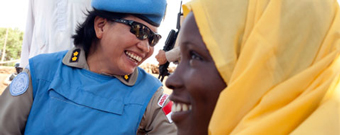UN deploys women protection advisers to curb sexual violence
By Thalif Deen | Last updated: Aug 2, 2013 - 1:18:18 PMWhat's your opinion on this article?

A UN Police Officer with UNAMID interacts with women at a water point in Abu Shouk Internally Displaced Persons (IDP) camp in North Darfur. Photo: UN Photo/Albert Gonzalez Farran
|
Describing rape as “a weapon of war,” Secretary-General Ban Ki-moon told the Security Council in June that sexual violence occurred wherever conflicts raged, “devastating survivors and destroying the social fabric of whole communities.”
“It was a crime under international human rights law and a threat to international peace and security,” he said.
Since most of the heinous crimes are taking place in conflict zones overseen by UN peacekeeping missions, the United Nations is unleashing an army of Women Protection Advisers (WPAs) to specifically curb sexual violence in war zones.
For starters, they will be deployed with peacekeeping missions in South Sudan, the Central African Republic, Cote d’Ivoire, DRC, Mali and Somalia.
Asked if these WPAs will be confined to Africa, Andre-Michel Essoungou of the Public Affairs Division at the UN’s Department of Peacekeeping Operations and Field Support told IPS, “There is no restriction to a region of the world in this regard. But the process is starting with these missions for the time being.
“The recruitment procedures are currently underway,” he added.
Marcy Hersh, a senior advocate for women and girls’ rights at Refugees International, told IPS her organization insists that prior to the further deployment of WPAs to peacekeeping and political missions, the United Nations should take urgent action to ensure that WPAs are trained before their deployment and encouraged to work collaboratively with already operational humanitarian structures.
Additionally, they should be held accountable to fundamental and non-negotiable ethical and safety criteria for investigating sexual violence in conflict, which preserves the safety and dignity of survivors.
She said the recently unanimously passed Security Council Resolution 2106 includes language that is in accordance with these recommendations in its calls for the timely deployment of WPAs, their adequate training, and their coordination across multiple sectors.
Given this strong language, combined with the statements from multiple member states that WPAs should be deployed to all peacekeeping and political missions, Ms. Hersh said, “I am confident that the United Nations will work urgently to improve the rollout of WPAs.”
She said she is also hopeful that the United Nations will ensure that WPAs collect timely, objective, accurate and reliable information as a basis for prevention and response programming and preserve the safety and dignity of sexual violence survivors.
The secretary-general said that UN Women and the Department of Peacekeeping Operations have developed, on behalf of the UN Action Network, the “first-ever scenario-based training program for peacekeepers,” some of whom, along with aid workers, have been accused of sexual violence—specifically in South Sudan, DRC, Cote d’Ivoire and Haiti.
The United Nations will also set up a team of experts on “the rule of law and sexual violence in conflict,” described as an important tool for strengthening national justice systems and legal frameworks.
The team has already provided technical advice to governments in the Central African Republic, Colombia, Cote d’Ivoire, DRC, Guinea, Liberia, Somalia and South Sudan.
Zainab Hawa Bangura, the UN’s special representative on sexual violence in armed conflict, points out that 20 years ago, the United Nations had provided “irrefutable evidence” of widespread and systematic rape in the countries of the former Yugoslavia.
She said that during a recent visit to Bosnia—where an estimated 50,000 women had been raped or been victims of sexual violence—she discovered that, to date, only a handful of prosecutions had occurred.
“Thus the victims of those crimes continue to walk in shadow and shame, unable to lay the past to rest and move forward.”
More recently, in late June, the United Nations described as “unacceptable” several cases of rape of young girls in DRC.
Nine young girls, aged between 18 months and 12 years, were admitted to a hospital in South Kivu with marks of violence on their bodies and very serious internal wounds, resulting in the death of two.
There have also been widespread reports of 135 women and girls allegedly raped by government soldiers in Minova in eastern DRC back in 2012.
INSIDE STORIES AND REVIEWS
-
-
About Harriett ... and the Negro Hollywood Road Show
By Rabiah Muhammad, Guest Columnist » Full Story -
Skepticism greets Jay-Z, NFL talk of inspiring change
By Bryan 18X Crawford and Richard B. Muhammad The Final Call Newspaper @TheFinalCall » Full Story -
The painful problem of Black girls and suicide
By Charlene Muhammad -National Correspondent- » Full Story -
Exploitation of Innocence - Report: Perceptions, policies hurting Black girls
By Charlene Muhammad -National Correspondent- » Full Story -
Big Ballin: Big ideas fuel a father’s Big Baller Brand and brash business sense
By Bryan Crawford -Contributing Writer- » Full Story






 Click Here Stay Connected!
Click Here Stay Connected!








